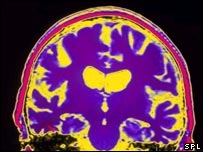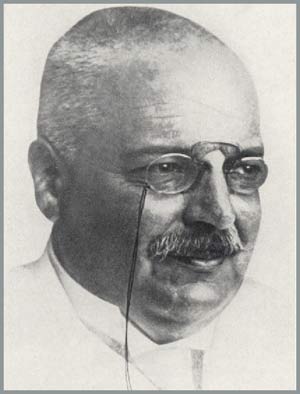Alzheimer's disease after a century of discovery

Brain scan of Alzheimer's patients.(Photo: BBC)
Many activities and seminars on Alzheimer's disease have been held in many countries this November to mark the 100th anniversary of German neuroscientist Dr. Alois Alzheimer (1864-1915) describing the disease for the first time this. Although many approaches can limit the effects of Alzheimer's disease, medicine has yet to find a cure for dementia in this elderly person.
Back in history, in November 1906, Dr. Alois Alzheimer first described the case of Auguste's patients with dementia at the age of 50 and died shortly afterwards. He recorded in medical records: 'Auguste D always suffers from insomnia and confusion '. Treatment includes bowel enemas in the afternoon break, early evening with a combination of alcohol and tranquilizers in a light dose to help patients fall asleep.
A century later, scientists better understand the disease named after Dr. Alzheimer's and can detect the disease earlier. But the world has yet to find a way to treat or prevent onset disease. Professor Simon Lovestone of the Alzheimer's Research Foundation (UK) is optimistic that medicine will soon have a cure for the disease.'Although it is impossible to completely recover degenerated brain function, some of the effects of the disease will be repelled. At that time, the quality of life of patients will be greatly improved, ' he said.

Alois Alzheimer (1864-1915)
(Photo: alp.mcgill.ca)
However, Dr. Hugh Pearson of the University of Leeds said there are still major obstacles to the study of treatments. It is a lack of early diagnosis techniques and cannot easily reverse the self-destruction of nerve cells in the brain. If these two problems are overcome, the disease has a chance to cure.
Professor Seth Love of Bristol University also said that due to the complex nature of Alzheimer's disease, it is difficult to hope for a single drug or intervention to prevent or cure the disease effectively. However, by encouraging people to change their lifestyles, such as diet, to reduce the risk of disease, and by interfering with inhibiting factors related to the progression of disease, I believe they We will make progress in the method of prevention and treatment. Meanwhile, US experts say many new therapies directly target the basic mechanisms of Alzheimer's disease, including drugs that block the formation of protein-rich plaque causing brain damage - characteristic of sick.
Currently, the Alzheimer's Foundation in the UK is conducting two studies to prevent disease through regulating eating habits. One is to study B-vitamins to reduce homocysteine levels - which are linked to Alzheimer's disease and heart disease. The remaining research focuses on fish oils containing omega-3 fatty acids. In addition, many studies show that exercise, especially in middle age, can reduce the risk of disease. A balanced diet, increased physical activity, and mental clarity by solving puzzles and crossword are ways to help prevent disease risks.
MH (According to BBC)
Several other methods in the process of testing promise the ability to diagnose and prevent Alzheimer's disease from progressing.Research from the University of California said curcumin in curry powder has the ability to reduce the formation of plaque causing dementia in Alzheimer's patients.The Blanchette Rockefeller Institute of Mental Sciences (USA) developed a simple skin test that identifies chemical changes to distinguish early Alzheimer's disease from other neurodegenerative diseases.
In addition, Alzheimer's disease can be detected early by eye examination or blood test.Many experts agree that a diet high in fish, fresh vegetables, dairy products, and red meat may reduce the risk of developing the disease because it helps maintain blood vessels to the brain and provide more. Antioxidant vitamin to protect brain cells from degeneration.
- The mysterious disease that killed many pirates in the 18th century is gradually appearing
- Important findings about treatment for HIV in 2011
- A 4-year-old girl was
- New drugs treat HIV and malaria
- New discovery of Parkinson's disease
- Only 1 year left, the HIV vaccine will be officially tested on humans
- The origin of the HIV-AIDS epidemic century
- Will HIV be eliminated in 2030?
- The disease is hidden in a masterpiece painting for a century
- When does the most terrible disease appear on Earth?
- Rats are about to cause heart disease?
- 5 types of epidemics across the century
 Green tea cleans teeth better than mouthwash?
Green tea cleans teeth better than mouthwash? Death kiss: This is why you should not let anyone kiss your baby's lips
Death kiss: This is why you should not let anyone kiss your baby's lips What is salmonellosis?
What is salmonellosis? Caution should be exercised when using aloe vera through eating and drinking
Caution should be exercised when using aloe vera through eating and drinking